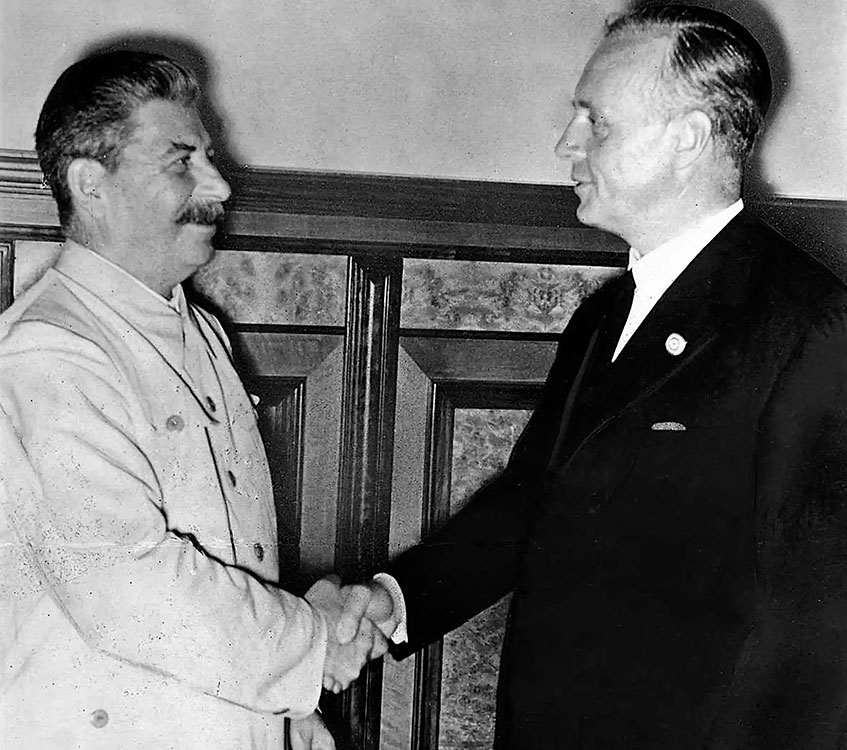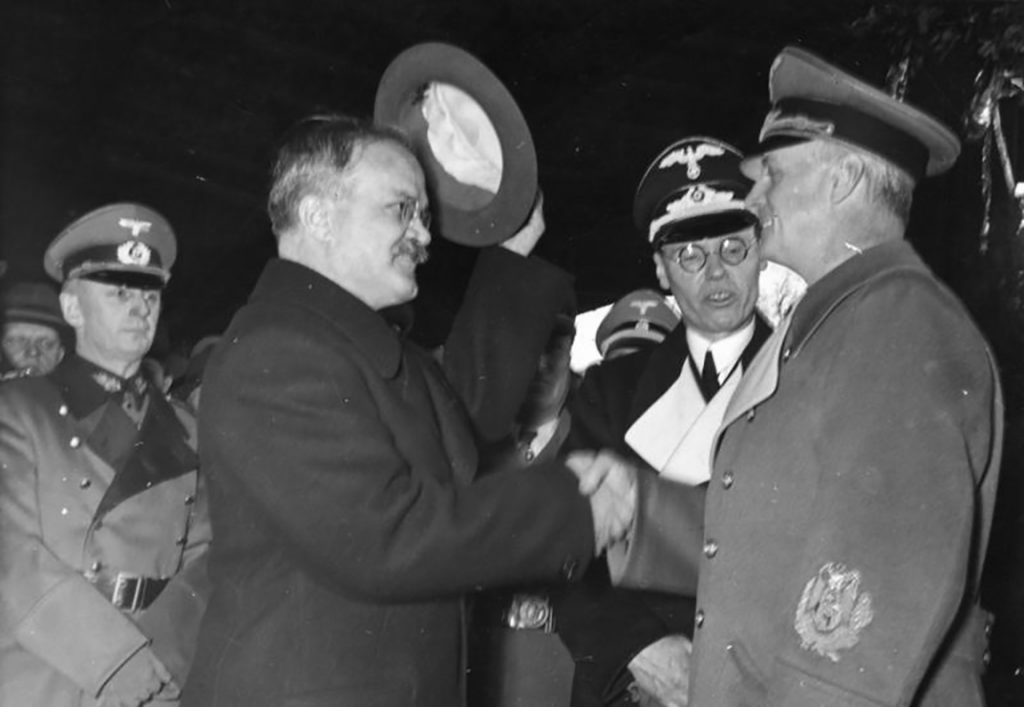During the night of June 21-22, 1941, Germany attacked the USSR. In spite of the warnings coming from all sides, Stalin did not believe Hitler would strike. Why did he stick with such obduracy to his agreement with Berlin? Stalin had understood very early that Hitler was going to undermine the European order, and he was eager to be associated temporarily to this work of destruction, expecting to pursue it later for his own account. Stalin was convinced, as soon as Hitler came to power, that a new European war would bring the victory of communism in all Europe. The agreement with Germany was a personal matter for him.
By Françoise Thom in DeskRussia — June 16, 2021 —
Stalin did not give preference to the Germans in extremis. He understands very early that Hitler means war. On January 26, 1934, he declared at the XVII Congress: “Things are moving towards a new imperialist war… It will certainly trigger the revolution and endanger the very existence of capitalism in a series of countries”. He was well aware that the Bolsheviks had taken advantage of the First World War to seize power in Russia, and he was convinced that after a new European war, communism would sweep throughout Europe.
At the end of April 1933, he informed Hitler that the USSR wished to preserve and strengthen the bilateral friendly relations between Germany and the USSR. In November 1933, on Stalin’s orders, Litvinov, the People’s Commissar for Foreign Affairs, met von Neurath, the Reich’s Minister of Foreign Affairs, and suggested that for the USSR, relations with Germany were more important than relations with France or Poland. On May 5, 1935, eager to convince Berlin that the Franco-Soviet rapprochement was only a second best in his eyes, Stalin ordered Kandelaki, his personal emissary in Berlin, to transmit the following message to his German interlocutors: “…We tried to receive guarantees from the German government, but we did not succeed. That is why we signed the Franco-Soviet pact of mutual assistance […] This pact should not prevent the establishment of more serene and correct relations with Germany, on the contrary it should promote them” [L. Bezymenski, Hitler i Stalin pered skhvatkoy, Moskva 2000, p. 97-8].
In July 1935, Stalin made a new approach: he expressed his desire to reach a rapprochement in Berlin (Schacht-Kandelaki talks) at the time of the VIIth Congress of the Komintern, while the USSR launched an “anti-fascist” campaign with great fanfare. Against the opinion of all his diplomats, who believed that Germany had definitely committed itself to an anti-Soviet policy, Stalin persevered, imagining that his personal intervention, the sending of a Georgian emissary close to him, could unblock things with Hitler.

Stalin preferred the German alliance, first because he hated England; then there were reasons of internal politics: an agreement with the democracies would have forced him to soften his dictatorship, even formally. With Hitler and his people, “he felt as if he were among party comrades”, to use the expression of Ribbentrop, delighted after his banquet in the Kremlin in August 1939 (for the same reason, some members of the Politburo, especially the non Russians Beria, Mikoïan, Kaganovitch, secretly leaned towards the rapprochement with the democracies, which would force Stalin to limit himself, making a recurrence of the great terror improbable).
Stalin and Molotov are well aware of an ideological affinity with the Reich. Molotov confided in Rudolf Hess on November 13, 1940: “Germany and the USSR are similar in many respects because both have a party and a state of a new type”. The German-Soviet pact, concluded in the greatest secrecy (even for the members of the Politburo), is perceived by Stalin as a huge personal triumph. The USSR attained the status of great power that the Western democracies had denied it. The Kremlin extracted major concessions from Germany for the price of a neutrality that was beneficial to the USSR. The words and deeds of the Soviet leaders show that this was not a temporary arrangement for them but a serious turning point that had to be reflected in the policy of the communist movement.On September 7, 1939, Stalin explained to Dimitrov, the head of the Comintern, how to justify the about-face imposed on the communists, who were now told to denounce “the Anglo-French warmongers” instead of extolling “the anti-fascist front”: “The distinction between fascist states and democratic states no longer makes sense… The war pits two groups of capitalist countries against each other for the division of the world […]. We are not against this war: let them tear each other apart and weaken each other! It is good that, through the hands of Germany, the position of the richest capitalist countries (especially England) is shaken. Hitler, unwittingly and unknowingly, is subverting and destroying the capitalist system… We can maneuver, stir up war between them, so that they will be at each other’s throat. […]”

Stalin goes even further when he confided to Ribbentrop, on September 27, 1939: “Mr. Foreign Minister indicated […] that Germany did not understand cooperation as military aid and did not intend to drag the Soviet Union into the war. …] It is clear that Germany does not need help now and will not need it in the future. But if, contrary to our expectations, Germany should find herself in a difficult situation, she can be sure that the Soviet people will come to her aid and will not tolerate her being crushed. The Soviet Union has an interest in a strong Germany and will not allow Germany to be thrown to the ground” [L. Bezymenski “Vizit V. M. Molotova v Berlin v noyabre 1940 g. v svete novykh dokumentov”, Novaya i noveishaya istoriya, No. 6, 1995, p. 128].
Let us not forget Molotov’s immortal speech of October 31, 1939, before the Supreme Soviet: the French and British warmongers “have declared a kind of ‘ideological’ war on Germany, reminiscent of religious wars of long-gone times. In any case, it is under the ‘ideological’ banner that the war began […]. One can either accept or reject the National Socialist ideology like any other ideological system; it is a matter of political opinion. But everyone should recognize that an ideology cannot be destroyed by force, nor can it be eliminated by war. Therefore, it is not only meaningless, but even criminal to wage such a war with the aim of ‘destroying Hitlerism’, camouflaged under the pretext of defending ‘democracy’ […] Our relations with Germany have improved in a fundamental way” because they “rest on the solid basis of common interests”. A remark made to the Foreign Minister of Turkey, Saracoğlu, on October 1, 1939, shows that Stalin had calmly considered the possibility of war with France and England at the time he attacked Poland: “We have shared Poland with Germany, and France and England have not declared war on us. But it can happen. We have no mutual assistance pact with the Germans, but if the French and the English declare war on us, we will have to fight on the side of the Germans…” [Dokumenty vneshney politiki. 1939, Moskva, Mezhdunarodnyye otnosheniya, 1992. T.XXII, vol. 2, p. 149].
On August 7, 1940 Molotov bluntly declared to the British ambassador Cripps that “the policy of neutrality of the Soviet government is not the same towards England as towards Germany. The USSR attaches great importance to the non-aggression pact with Germany…” [A. N. Jakovlev, 1941 god, Moscow, 1998, t.1, p. 163.].
In all areas, Stalin tried to make himself useful to Hitler, to show his goodwill and the strength of his commitment to his side. The USSR became a reservoir of raw materials for Germany, which was subjected to the Western blockade. The base of Murmansk was put at the disposal of the Germans, the Soviets even providing warm clothes to the German sailors! When Molotov went to Berlin from November 12 to 14, 1940, Stalin asked him to “prepare a first outline of the sphere of interests of the USSR in Europe, the Middle East and Middle Asia, exploring the possibility of an agreement in this regard with Germany, and then with Italy” [L.A. Bezymenski op.cit., p. 121-143; Ya. Sipols “Eshche raz o diplomatitcheskoy dueli v Berline v noyabre 1940 g”, Novaya i noveyshaya istoriya, n° 3, 1996, p. 145 and following.]
The dictator hoped especially for a sharing of the Balkans with Germany: on this condition he was planning to join the tripartite pact between Germany, Italy and Japan. He attributed the failure of this beautiful project to Molotov’s rigid attitude and later multiplied his messages to Hitler, implying that he was ready to bargain in person. Until June 22, 1941, he remained a prisoner of this dream, fearing only that a pro-English lobby in Berlin would incite Hitler to switch alliances. This explains his extraordinary behavior in the spring of 1941, his stubborn refusal to recognize the German threat, despite the warnings that were pouring in from all sides. On the evening of June 21, Stalin still did not believe in war, while the other members of the Politburo urged him to take action. Even in the first moments after the German attack, on June 22 at 3:15 a.m., Stalin continued to believe that it was a provocation of the German generals. He ordered the troops to repel the offensive, but without crossing the border. Total mobilization was not declared until twelve hours after the German attack.
Stalin had bet on his relationship with Hitler and he had lost. On June 28, he retired to his dacha and when a delegation from the Politburo came to ask him to head the war cabinet, he thought at first that his colleagues would arrest him. The myth of his infallibility was dead. Within his inner circle, the seeds of de-Stalinization had been planted.
Françoise Thom
See also : « Pourquoi Staline refusait-il de croire à une attaque allemande ? » by Françoise Thom in DeskRussie (June 16, 2021).










